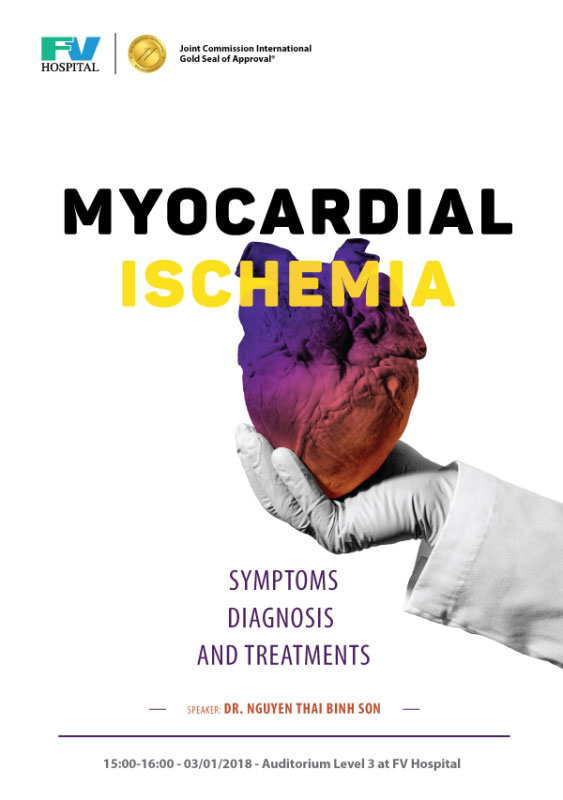Myocardial ischemia or myocardial infarction can damage the heart, reducing the heart’s pumping function and causing fatal cardiac arrhythmias. If the coronary artery is completely blocked, it will cause a heart attack. This is viewed as the leading cause of death in patients with cardiovascular diseases.
What is myocardial ischemia?

Myocardial ischemia is a condition in which the coronary arteries (blood vessels that feed for the heart) reduce the flow of nutrient-rich blood and oxygen to nourish the heart muscle, leading to the risk of angina.

Symptoms of myocardial ischemia are common
Some people with ischemic heart disease do not experience any signs or symptoms, which is also called silent ischemic heart disease. When the arteries are narrower that the blood supply to the heart is severely reduced, the person may experience some of the symptoms, which chest pain is the most common one. The pain usually spreads to the neck, jaw, shoulders, and left arm, along with other symptoms such as:
– Shortness of breath, especially when in exertion
– Tired
– Nausea, vomiting and epigastria pain
– Sweating
– Fast heart rate, nervous, palpitations
– Dizzy, vertigo or fainting
Is myocardial ischemia dangerous?
Patients with myocardial ischemia if are not treated properly may encounter some complications such as:
Heart attack: A complete blockage of the coronary arteries is usually associated with a break in the plaque causing a blood clot that causes an area of the heart muscle to die due to anemia for long periods of time.
Heart failure: The heart muscle does not receive enough blood to maintain its activity following the needs of the body, which is called heart failure.
– Arrhythmia: the poor response of cardiomyopathy to cardiac arrhythmias results in abnormally fast heart rate.
Guidelines for managing chest pain due to myocardial ischemia
An acute myocardial infarction is emergency case that requires immediate life support acts due to its high mortality rate. If you or your relatives experience any symptoms of ischemic heart disease, please follow the instructions below:
– Stop working, sit still or lie down to rest.
– Sublingual or sprayable vasodilation medications (if the doctor prescribed).
– If the pain lasts for more than 5 minutes, immediate seek for medical assistance as this can be a heart attack; Call your relatives for help.
How to diagnose myocardial ischemia?
At present, the diagnosis of myocardial ischemia can be conducted easily, thanks to the extensive cardiac investigations. Tests to diagnose the status of myocardial ischemia include blood tests, X-rays, CT scans or magnetic resonance imaging (MRI), electrocardiography, echocardiography and coronary angiography to check for coronary artery occlusion.
Can myocardial ischemia be cured? What are the effective drugs and specific treatments of myocardial ischemia?

 Vi
Vi 












